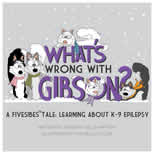Hypothyroidism, Epilepsy and Phenobarbital
Written By: Dr WB Thomas DVM, Dipl.ACVIM(Neurology)
Hypothyroidism is a common disorder in dogs and is characterized by abnormally low production of thyroid hormones. In most cases this happens because the dog's immune system destroys the thyroid glands. Signs of hypothyroidism are varied, but include weight gain, lethargy, and hair loss. Neurologic signs of hypothyroidism include generalized muscle weakness, problems maintaining balance, and difficulty swallowing.(1) Although seizures are listed as a sign of hypothyroidism in some texts, a definitive cause-and-effect relationship has not been established. Nevertheless, some veterinarians feel that hypothyroidism can cause or at least exacerbate seizures in susceptible dogs.
Diagnosis:
Hypothyroidism is associated with abnormally low blood levels
of the hormone thyroxine (total T4). Unfortunately, diagnosis
of hypothyroidism can not always be based solely on a low T4 level.
This is because factors other than hypothyroidism can cause low
T4 levels. For example, many medical illnesses cause temporarily
low T4 levels. This is called the euthyroid sick syndrome. This
change in thyroid function may be an important protective mechanism
by the body and does not require treatment. In fact, administering
thyroid supplements to dogs with the euthyroid sick syndrome may
be detrimental. Similarly, many drugs, including phenobarbital,
may cause low levels of total T4 (see below).
Because of the influence of these factors, diagnosis of hypothyroidism often requires the measurement of several different thyroid hormones, for example free T4, T3, and thyroid-releasing hormone (TSH). This is especially true for dogs with other illnesses, such as epilepsy.
Influence of drugs
on thyroid function:
In people, phenobarbital lowers the blood concentration of thyroid
hormones but does not induce clinical signs of hypothyroidism.
Treatment with thyroid replacement therapy is not necessary in
these patients. A recent study found that long-term administration
of phenobarbital to normal dogs caused a decrease in total T4
and free T4 measurements. Thyroid hormone concentrations returned
to normal after phenobarbital was stopped.(2,3) These effects must be considered when testing thyroid function
in dogs taking phenobarbital. Potassium bromide, another commonly
used antiseizure drug, does not seem to affect thyroid hormone
levels.(4)
Treatment:
Treatment of hypothyroidism consists of daily oral administration
of thyroid hormone, usually levothyroxine (L-thyroxine). At appropriate
doses, treatment is effective and safe. Considering the adverse
effects on health caused by low thyroid function, dogs with epilepsy
and hypothyroidism should be treated regardless of any potential
association between hypothyroidism and epilepsy. Treatment is
indicated only when the diagnosis has been confirmed by appropriate
laboratory testing. Empiric treatment of epilepsy with thyroid
supplementation is not indicated in the absence of documented
hypothyroidism.
WB Thomas DVM
Dipl.ACVIM(Neurology)
University of Tennessee
Knoxville, TN
References
1.
Jaggy A, Oliver JE, Ferguson DC, Mahaffey EA, Glaus jun T. Neurological
manifestations of hypothyroidism: A retrospective study of 29
dogs. J.Vet.Int.Med. 1994; 8:328-336.
2.
Muller PB, Wolfsheimer KJ, Taboada J, Hosgood G, Partington BP,
Gaschen FP. Effects of long-term phenobarbital treatment on the
thyroid and adrenal axis and adrenal function tests in dogs. J.Vet.Int.Med.
2000; 14:157-164.
3. Geiger TL, Hosgood G, Taboada J, Wolfsheimer KJ, Mueller PB.
Thyroid function and serum hepatic enzyme activity in dogs after
phenobarbital administration. J.Vet.Int.Med. 2000; 14:277-281.
4.
Paull LC, Scott-Moncrieff JCR, DeNicola DB, Davidson D, Glickman
LT, Refsal KR. Effect of potassium bromide (KBr) at anticonvulsant
dosages on thyroid function and morphology. J.Vet.Int.Med. 2000;
14:362-362. (Abstract).
Page last update: 12/13/2011










